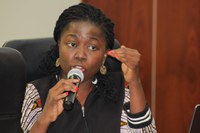Round-table pays attention to women’s representation during elections
One of the issues that came up during this round-table was the fact that women do not have access to money that election campaigns require.
At this event, Dr Nomsa Masuka, the Commissioner at the Electoral Commission of South Africa, discussed issues relating to free and fair elections and women’s representation in elections. She provided some interesting statistics and stated that women make up 55% of the voters role in South Africa. “According to 2014 voter turnout statistics, 76% were women. There is a clear indication that women take more interest in voting than men,”she pointed out.
However, she said, post elections and representation in South Africa is not so reflected. “Looking at South Africa’s hybrid proportional representation system and its first-past-the-post system, there is a systemic pattern which indicates that women are largely promoted through the proportional representation system.”
She then posed a very important question asking whether there is a causal link between the lack of women’s representation and the lack of service delivery at a local government level.
This was reiterated by Ilona Tip from the Electoral Institute of Sustainable Democracy in Africa who spoke on elections and political accountability. In her presentation she also touched on the representation of women and stated that political parties like the ANC have policies that ensure female representation.
She also looked at the social and political context of why fewer women could be involved or represented. She pointed out that women, in most cases do not have the financial access that campaigns require, this includes encouraging people to vote for you by giving away things during the pre-campaign period.
Furthermore, Ms Tip examined the correlation between the low number of young voters and the parties that represent the interests of the youth. There is essentially a misrepresentation of interests when the older generations continue to hold majority of the votes. She said there is also a lack of interest in voting from South Africans outside of the country who are eligible to vote
The third speaker was Dr Nkosikhulule Xhawulengweni Nyembezi from Election Monitoring Network who looked at voters and their representatives. He provided an overview of how candidate selection works and how often there is manipulation by political parties. “
There is also the issue of political candidates who are technically not eligible or those who lack political integrity. There needs to be an extension of inquiry into the political candidates and elective positions” he pointed out.
He argued for implementation of electoral laws, ballot integrity, administrative convenience, and to ensure that people who are elected will commit to service delivery. This includes acting in invited and invented spaces.
The elections in South Africa are scheduled for 8 May 2019. Elections remain one of the most important processes not only for political accountability, but also for empowering the people to make choices about their leaders. A right choice can lead to better service delivery to the people, while a wrong choice may undermine the enjoyment of basic rights and entitlements, including water, sanitation housing and health.

